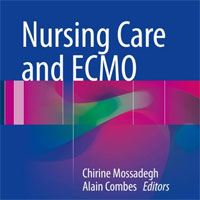Tag: ECMO

Extracorporeal Life Support for Adults
This book presents a concise, evidence-based review of extracorporeal life support (ECLS) for adult diseases. It describes the use of ECLS with patients who are experiencing severe hypoxemic respiratory failure (ARDS and... read more

Platelets and Fibrinogen Matter When Bleeding on ECMO
Fibrinolysis is poorly investigated in ECMO patients, partly due to a lack of routine laboratory tests evaluating fibrinolysis. Hence, hyperfibrinolysis may be a contributor to bleeding risk during ECMO treatment. However,... read more

ECPR in 2023
Extracorporeal cardiopulmonary resuscitation (ECPR) is invasive and resource intense. Data suggesting a survival benefit in patients after OHCA and ECPR derive from retrospective registries and meta-analyses. In order to... read more

Propofol-Related Infusion Syndrome in a Child with RSE
Propofol is used for sedation, anxiolysis, anesthesia induction, and as an anticonvulsant. In cases of refractory status epilepticus (RSE), propofol is more efficient than barbiturates. We present a case of a 3-year-old... read more

Age and Associated Outcomes Among Patients Receiving V-A ECMO
In a multinational study using the ELSO Registry, we found that increasing age was strongly associated with higher risk of hospital mortality and complications among patients receiving V-A ECMO for cardiogenic shock, with... read more

ECMO-Extracorporeal Life Support in Adults
Extracorporeal membrane oxygenation (ECMO) has been in clinical use for some 40 years, but it is only in the past decade that its application in the treatment of life-threatening circulatory and respiratory failure has truly... read more

Revisiting VA-ECMO in Infarct-related Cardiogenic Shock
Despite advances in medical therapies and coronary revascularization, infarct-related cardiogenic shock remains a life-threatening emergency with high death rates. Temporary mechanical circulatory support, including peripheral... read more

Using Deep Neural Networks for Survival Prediction in VA-ECMO
Venoarterial extracorporeal membrane oxygenation (VA-ECMO) is a complex and high-risk life support modality used in severe cardiorespiratory failure. ECMO survival scores are used clinically for patient prognostication... read more

Anticoagulation in the ICU: Contact Pathway Inhibition Future
Bleeding and thrombotic complications are the main cause of morbidity and mortality in critically ill patients on the intensive care unit (ICU), receiving short-term percutaneous mechanical circulatory support (pMCS) by extracorporeal... read more

Nursing Care and ECMO
This highly informative book provides essential insights for ICU nurses at ECMO centers around the world, who face the substantial challenges involved in the management of ECMO patients. Above all, it meets their training... read more

The impact of diabetes mellitus on morbidity and mortality in patients with COVID-19
During the COVID-19 pandemic, healthcare delivery was affected in various ways. For example, acute and chronic cardiovascular diseases (CVDs) and events were less frequently observed in hospitals, both because public health... read more

Updated Systematic Review on Remdesivir’s Safety and Efficacy in COVID-19 Patients
Remdesivir, an antiviral medication, may benefit patients who are infected with mild or moderate forms of COVID-19 infection. Several research findings have suggested the safety and efficacy of remdesivir for a five- to 10-day... read more

VA-ECMO in High-Risk Pulmonary Embolism
High-risk Pulmonary Embolism (PE) has an ominous prognosis and requires emergent reperfusion therapy, primarily systemic thrombolysis (ST). In deteriorating patients or with contraindications to ST, Veno-Arterial Extracorporeal... read more

Verticalization Therapy for ARDS Patients Receiving VV-ECMO
Persistent hypoxemia during veno-venous extracorporeal membrane oxygenation (VV-ECMO) for supporting acute respiratory distress syndrome (ARDS) patients is a clinical challenge for intensive care medical providers. Prone... read more



